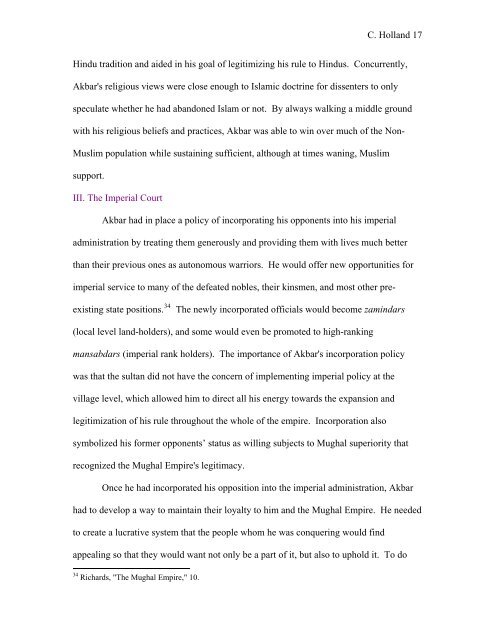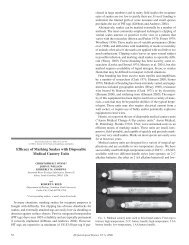Akbar and the Mughal State - University of Georgia
Akbar and the Mughal State - University of Georgia
Akbar and the Mughal State - University of Georgia
You also want an ePaper? Increase the reach of your titles
YUMPU automatically turns print PDFs into web optimized ePapers that Google loves.
C. Holl<strong>and</strong> 17<br />
Hindu tradition <strong>and</strong> aided in his goal <strong>of</strong> legitimizing his rule to Hindus. Concurrently,<br />
<strong>Akbar</strong>'s religious views were close enough to Islamic doctrine for dissenters to only<br />
speculate whe<strong>the</strong>r he had ab<strong>and</strong>oned Islam or not. By always walking a middle ground<br />
with his religious beliefs <strong>and</strong> practices, <strong>Akbar</strong> was able to win over much <strong>of</strong> <strong>the</strong> Non-<br />
Muslim population while sustaining sufficient, although at times waning, Muslim<br />
support.<br />
III. The Imperial Court<br />
<strong>Akbar</strong> had in place a policy <strong>of</strong> incorporating his opponents into his imperial<br />
administration by treating <strong>the</strong>m generously <strong>and</strong> providing <strong>the</strong>m with lives much better<br />
than <strong>the</strong>ir previous ones as autonomous warriors. He would <strong>of</strong>fer new opportunities for<br />
imperial service to many <strong>of</strong> <strong>the</strong> defeated nobles, <strong>the</strong>ir kinsmen, <strong>and</strong> most o<strong>the</strong>r pre-<br />
existing state positions. 34 The newly incorporated <strong>of</strong>ficials would become zamindars<br />
(local level l<strong>and</strong>-holders), <strong>and</strong> some would even be promoted to high-ranking<br />
mansabdars (imperial rank holders). The importance <strong>of</strong> <strong>Akbar</strong>'s incorporation policy<br />
was that <strong>the</strong> sultan did not have <strong>the</strong> concern <strong>of</strong> implementing imperial policy at <strong>the</strong><br />
village level, which allowed him to direct all his energy towards <strong>the</strong> expansion <strong>and</strong><br />
legitimization <strong>of</strong> his rule throughout <strong>the</strong> whole <strong>of</strong> <strong>the</strong> empire. Incorporation also<br />
symbolized his former opponents’ status as willing subjects to <strong>Mughal</strong> superiority that<br />
recognized <strong>the</strong> <strong>Mughal</strong> Empire's legitimacy.<br />
Once he had incorporated his opposition into <strong>the</strong> imperial administration, <strong>Akbar</strong><br />
had to develop a way to maintain <strong>the</strong>ir loyalty to him <strong>and</strong> <strong>the</strong> <strong>Mughal</strong> Empire. He needed<br />
to create a lucrative system that <strong>the</strong> people whom he was conquering would find<br />
appealing so that <strong>the</strong>y would want not only be a part <strong>of</strong> it, but also to uphold it. To do<br />
34 Richards, "The <strong>Mughal</strong> Empire," 10.





